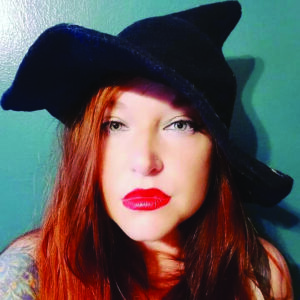by Chris Reeder-Young | photos courtesy of The Works
(Above photo: In this video screenshot from ‘The Guardian,” Roshun Austin visits a South Memphis convenience store. Convenience stores are often the source of ‘meals’ for neighborhood families. Austin and The Works Community Development Corporation work to make healthy food more readily available to residents.)
Roshun Austin is the Executive Director of The Works Community Development Corporation (CDC) in South Memphis. Along with residents and advocates, she leads neighborhood revitalization and cultural programs that build upon South Memphis historic anchors, assets and community visions. Her collective work and the stories about the area have been highlighted in pivotal documentaries, area planning collaborations and grassroots- level engagement activities that educate and influence long-term outcomes for South Memphis residents and advocates.
In 2009, The University of Memphis, foundations and community-driven organizations gathered and designed a South Memphis, asset-based community development planning assessment called SoMe RAP to garner feedback from the area’s citizens.
Austin shares that most of the assessment participants were “Black residents 60 years and older; they lived in very distressed neighborhoods and felt forgotten about.” She further adds, “their voices are very, very important because many of the residents who have remained in South Memphis neighborhoods have experienced some of the highest poverty rates in the nation, lowest life expectancies, and the least external financial investments.” This community-level feedback had, and still does, drive significant South Memphis projects that are addressing major health and wellbeing features, especially for seniors.

Older stakeholders identified various priorities for revitalization and community engagement that later shaped the Aging Mastery Program, an innovative and resident- focused program hosted at different anchor community centers so residents could access the opportunities and benefits that focused on health, financial well-being, and social connectedness.
South Memphis older adult feedback also shaped neighborhood-level resolutions to the area’s food deserts, green space improvements, and community engagement and walkability. The Works’ repair programming additionally helps seniors age in place in the home and improves health outcomes for both the senior and younger generations who may be experiencing asthma. Within immediate South Memphis neighborhoods, residents shared that social isolation and lack of connections to others were health threats for them. Walking groups were created to connect residents and to aid emotional wellbeing. This also expanded to becoming involved with advocating for “infrastructure like sidewalks and walkable spaces because transportation access is limited for seniors; they should be able to enjoy their amenities just like anyone else,” Austin said.
In response to the pandemic and seniors’ need to shelter in place, Austin shares they have served over 500 seniors in the area with shelf-stable products, large amounts of produce, cleaning supplies, bread and dairy. Because many of the seniors in the area cannot qualify for certain food benefits frequently available to families with small children, the role of The Works’ food security programs is significant as it serves the both seniors in the household but older family members and/or older neighbors they are also helping out. Austin says that older South Memphis residents are heads of households who can be helping multi-generational members also in their home who may have experienced foreclosure and/or evictions during the pandemic.
If you are moved by what was shared, you can help The Works in a few ways. Donating is a way to support non-profits, but you can also follow them on social media to remain connected to more educational opportunities (FB, Twitter, the newsletter, and IG).

When asked how Memphians can work toward a better future, Austin’s advice is “to love your neighbors, not just where you’re physically located, but places where they need you.” She says that doing something about blight, littering and demanding that leadership, city council and legislation invest in areas we there is zero investment is important so that you can be an advocate for the whole Memphis community. She also shares that it is important to elevate the voices that do not always get heard, and “pipe down enough so that the senior voices are being heard.” She encourages people “to move toward systemic change, not a one-off event or a selfie thing.” She closes by saying that people should “pay attention to land use cases and agendas, so that people become part of making sure we’re not doing detrimental things to our neighbors.”
Along with this incredible work is Austin’s sense of neighborly love for people inside and outside of South Memphis. She spearheads innovative actions and bolsters generational momentum that address major health disparities for certain Memphians, particularly South Memphis older, Black residents.




